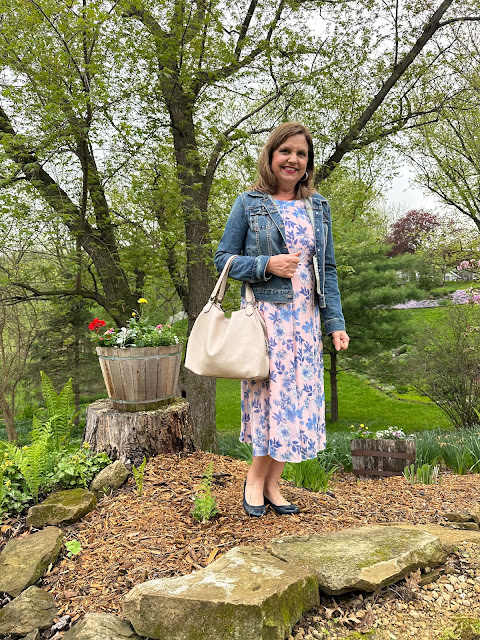One lesson I've learned in life is to never try making a Christmas project during Christmas time: you must always plan ahead. When I used to send handmade Christmas Cards out, I would make a few Christmas Cards every month all year long so I wasn't overwhelmed during the busy Christmas season. The same goes for a many other Christmas Crafts and even Christmas baking. I know women who always bake two loaves of banana or zucchini bread at a time all year long, and then freeze one to give away as Christmas gifts.
Fall is the ideal time for most people to start Christmas Crafts. That is why you see Hobby Lobby and all the other craft stores put out their Christmas merchandise after the 4th of July: to give time for the crafters to make their Christmas merchandise. But for me, fall is not a good time as I am a gardener and fall is one of my busiest times of the year. In the fall I'm cutting plants down, cleaning up the garden beds and getting them ready for winter, and most importantly I am preserving all my garden produce for the long winter ahead.
As soon as fall is over, the Christmas season arrives and I'm busy cleaning, decorating, and preparing for the little rugrats to arrive who spend a week with us every season (plus Thanksgiving too!). Then when they leave, the clean up begins again: all the decor comes down, all the beds are stripped, the blankets and sheets are washed, and the house is cleaned. And finally, the quiet of winter arrives. I now have three or four months with absolutely nothing to do. In past years, I've always had a home renovation project to complete, but now I can officially say the home is complete. Yay! Oh, there are always little things to do like repaint the bathroom ceiling (done 😀) and re-stain the sunroom window sills (not done 😞) but the big interior home renovations are done.
I also like to add a clean up and/or organizing project to my winter list; which doesn't always get done. I try to deep clean my kitchen by wiping down all the white cabinets with bleach and cleaning out all the drawers, and everything else that needs to be done in a kitchen. But it takes a long time to work my way around the entire kitchen, and this year I didn't make it that far. I usually get sick every winter which knocks me off my feet for a week or more and this year I added a head injury to the list when I stood up and knocked my head on an open cabinet and practically bled to death 😒. Ah, there is always something that keeps me from my most well laid plans. Hopefully I can get back to cleaning the kitchen before spring arrives. In the meantime, guess what? I decided to clean out my craft room! Yea, like I didn't have enough to do. I've been thinking about it for years, and I thought "I'm not getting any younger and I would hate to have my kiddos get stuck cleaning the mess, so I better get at it." We've lived in the same house for over thirty years, and I've been crafting most of my life, so it's a big project. So far, I've only made it about half way around the room, and I have filled a truck with craft donations. I thought of selling it, but that is so much darn work and heck, if I can donate it and bless someone else with it, that's a win-win for everyone.
So, all that to say, "NOW IS THE TIME TO MAKE A CHRISTMAS QUILT" 😁. Like I don't have enough to do this winter, right? But yes, now is the time to make a Christmas Quilt because as a gardener I can't quilt in the spring, summer, or fall, and I certainly can't quilt during the busy holiday season, so if I want a pretty Christmas quilt to lay out at Christmas time, I have to make it during the winter, my "slowest" time of the year. 😉
Every quilt has a story, and the story of this quilt began with a picture I saw on Pinterest. I sent the Pin to my good friend who is also a quilter and said "Isn't this pretty?" and she replied "It is! Lets each make one!" I really wasn't planning on quilting this winter, but I loved the idea of quilting with a friend, so I agreed.
Now, because I was in the process of cleaning out my craft room and saw how much unused fabric I had, I did not want to buy anymore fabric. I wanted to use what I had, and because of that my quilt didn't come out as pretty as the one on Pinterest which had perfect coordinating fabrics. I like the Pinterest quilt so much better, but I also like my version, and I can proudly say I didn't spend a single dime on this quilt and used my own stash...which is really how quilting all began isn't it? People needed blankets for warmth so they sewed bits and pieces of old clothing and fabric together to create a quilt. Many years later, this practical life hack became an art form.
There was no pattern for this Christmas Quilt on Pinterest, so I just had to eye ball it. I started by cutting squares of Christmas fabric and then I used my Accuquilt machine to cut out the Christmas Tree. If you don't have an Accuquilt machine you can just cut three triangle shapes to make your Christmas Tree as shown on the original quilt on Pinterest.
I then used my Accuquilt machine again to cut a tree shape out of fusible web. Then I ironed on the tree to the square and zig-zagged around the edges. I added a button to the top for a star. This was the part of the quilt that took the longest. Once all the squares were complete, the rest was a breeze and it came together pretty fast.
Next, I laid out all the squares on my craft desk. This was the hardest part for me as I was going boogey-eyed trying to decide the best pattern and trying hard not to put two of the same fabrics next to each other. I couldn't get a perfect layout, no mattered how hard I tried, and eventually gave up. "No quilt is ever perfect" I said to myself.
Once all the individual rows were sewed, I then sewed all the rows together.
For the border, I once again followed the Pinterest Inspiration Piece, and used different Christmas fabric. I cut those pieces out in a more narrow rectangle, sewed them together, then sewed them to the quilt. Ideally, I wish I would have used a solid fabric to create a narrow border between the blocks and the border. But, if I would have done that, then once again I would have had to purchase a backing fabric as the fabric I already owned wouldn't have been large enough and the whole point of making this quilt was to use up what I already owned.
And now for the hardest part of quilting: adhering the three pieces (quilt top, batting, and quilt backing) together. This is always so tricky, and mine did not come out perfect that's for sure but I did my best. I used a quilt basting spray to attach all three pieces together then I pinned. But when I turned my quilt over, I had quite a few bumps on the other side. (Do any other quilter's have that problem? How do you prevent it? I'd love to hear your tips in the comments below. ). I did my best to remove some of the bumps, but I couldn't smooth them all out.
I then quilted the three pieces together using the "Stitch in the Ditch" method as I do not own a Long-Arm Quilting Machine and I will never pay someone else to do it for me. Once again, my "stitch in the ditch" wasn't perfect, the needle kept wanting to slide out of the ditch, but I did my best. When I finished, I laid the quilt out on a table to cut off all the strings which was quite the job when one of my kitties thought it was a nice soft place to lay. 😁
The last part was to add the quilt binding. I chose to use a solid white as my binding.
For the backing I chose to use a soft Christmas flannel to make the quilt extra cozy. I never used flannel on a quilt before. I really like it as a backing.
At Christmas time, here is how I will display my quilt. It is just a lap quilt, so I will have it folded at the end of the bed.
I could also use it to snuggle with on my chaise lounge.
And here is a photo of my finished quilt.
And in case you're wondering, here is my friend's almost-finished quilt. Because she did the lattice, hers took a bit longer to finish than mine. I do love the lattice. She also did her outer boarder in one piece of Christmas fabric instead of using all different Christmas fabrics like in the Pinterest Inspiration piece. My friend's quilt is a great example of how you can be inspired by a project on Pinterest, but then you can make changes to make the quilt your own.
I hope you enjoyed my quilting post and hearing all about how I keep myself busy in the winter. I am definitely not one of those women who get bored at home and has to work outside the home.
Have A Great Day! Amy
Linking Up with these Fabulous Blogs HERE!
















































